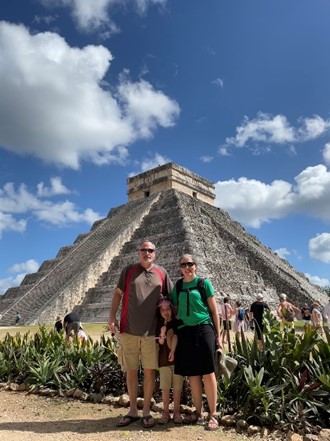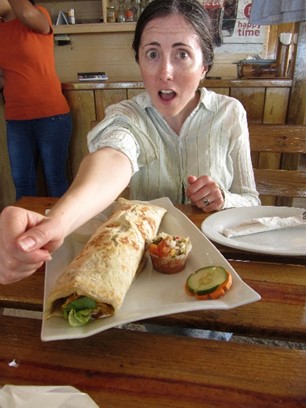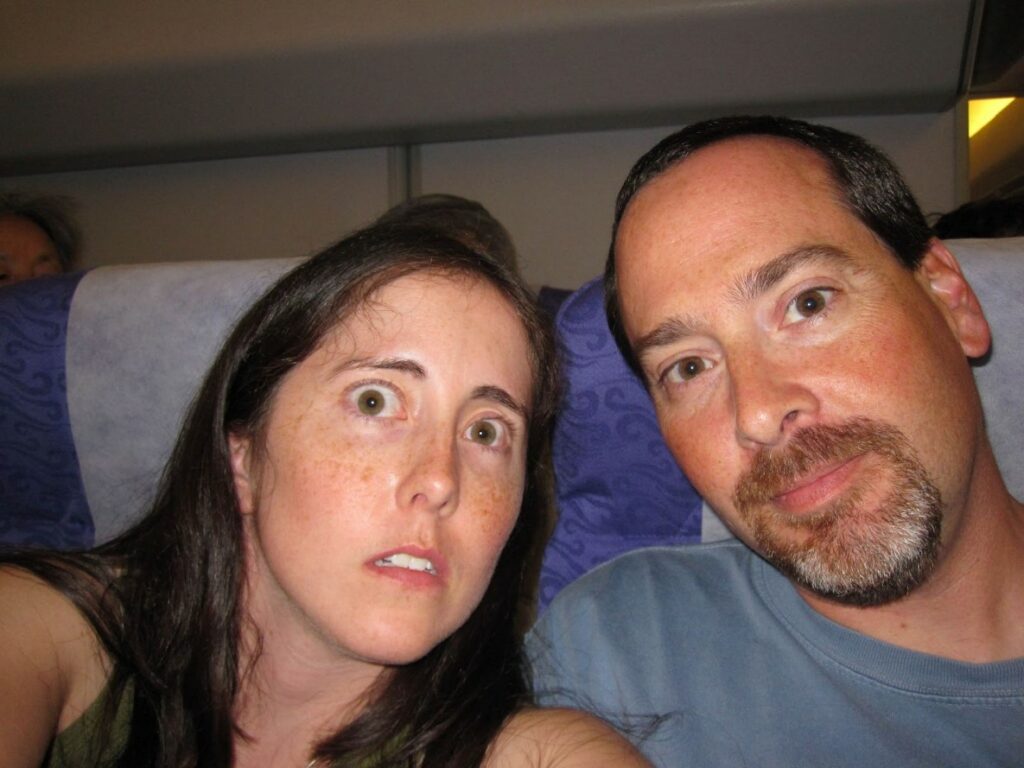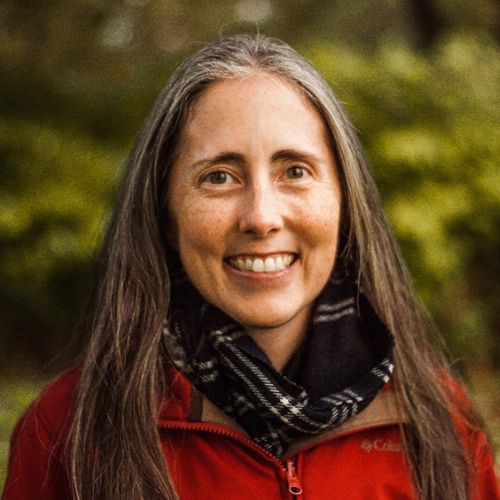Contents
Hello! Who are you?
Hello! My name is Julie Crawford and I live most of the year in Ohio with my husband, Kevin, and our 6-year-old daughter. We part-time slow travel and world school our daughter, typically for months at a time, but Ohio is our home base.
While I recently started a travel blog called Traveling Crawfords, my husband trades stock options. We can travel so regularly and for such long periods of time because we work online. We have been living this way for the past year and intend to keep doing so.

Along with traveling, I like to sew, organize pretty much everything, and attempt to grow vegetables. I try to have a garden every year, but I still lack a green thumb. In fact, I don’t have a thumb. Figuratively speaking.
I have spent most of my life being happy but of course, that doesn’t imply that I’ve always been content or haven’t faced struggles.
What is your struggle and when did it start?
Since I was young, I have struggled with various types of anxiety. It began as a worry about getting sick. Physically sick, like vomiting. My heart would race whenever I sensed even the smallest indication of something not feeling “quite right,” and I would get terrified that I was about to start feeling ill and begin vomiting.
Over time, I began to develop food anxiety. I never wanted to eat anything outside my normal comfort zone because I was afraid that any new food could make me sick.
If we didn’t eat at an American restaurant, dining out could be challenging. I would only order chicken fingers or grilled cheese sandwiches with fries. Those were my go-to meals since I was confident they wouldn’t “upset my stomach”. I never wanted to eat at a place that didn’t provide one of those two dishes.
The idea of being out with people, even my family whom I’ve been close with, and suddenly feeling sick and/or the sudden urge to need the bathroom, was terrifying.
Over the years, I’ve opened up more about my anxiety and the problems it causes. I’ll explain to people that when I get anxious, I can’t eat, sometimes even for days.
I can’t count how many times I have heard, “Oh man, I wish I could go for days without eating. It would help me lose weight!” Do you know that whole “the grass is always greener” thing? That applies here. It’s no fun being hungry. It’s no fun being anxious. Put the two together, and it’s a damn rough time.
I can remember several times feeling extreme pangs of hunger despite having the ability to get anything I wanted to eat or even literally being surrounded by food, but I physically couldn’t eat. My body simply wouldn’t allow it.
As I got older, I developed flying anxiety. I had never really liked flying, but I also had never been afraid of it. But in 2012, when I began a new job, I had to fly a few times for work. Within one to two flights, fear of turbulence and the general lack of control quickly formed into flying anxiety.
Leading up to trips that required flying, I began worrying about the anxiety I anticipated experiencing. To put it simply, I began causing anxiety for fear of having anxiety.
How did this struggle make you feel at your worst moments?
When anxiety strikes, my heart pounds, I feel hot and sweaty, my hands feel heavy like lead, and my stomach immediately clenches into a ball. The mere thought of food is revolting, but that doesn’t mean that my body doesn’t feel hungry.
In fact, I’d swear that my body’s hunger response increases once anxiety kicks in. But eating? Good luck. There is no way the anxiety is going to make eating easy or even possible. Yet, my body aches for nourishment and the pain of hunger to go away.
My worst moment was when my husband found me sobbing on the closet floor after I had just come home from work. My boss wanted me to work on something I had no idea how to do or any interest in doing. I already felt stupid and trying to work with a coworker on this project was only going to make me feel worse about myself.
Not only that, but I was also having major anxiety about our upcoming honeymoon. Yep, our honeymoon. That trip you take after you are married is supposed to be nothing but wonderful and magical, right? The trip we had planned to take a few months after our wedding sounded amazing and super worrying.
When I was anxious about our honeymoon, it was very clear to Kevin that I was having a hard time, but I was also very open about how I was feeling. I don’t think I’m able to hide my anxiety because it completely consumes me, and I become a different person. The “shell” of a person.
👉 Share your story: Help thousands of people around the world by sharing your own story. We would love to publish your interview and have a positive impact on the world together. Learn more here.
Was there a moment when you started to turn things around?
It took me years to finally seek professional help. After every anxiety attack was over and I was my “normal” self again, I would convince myself that I could overcome it on my own. I just needed to be stronger the next time. Whatever that meant.
But after I spent a night nauseous and hyperventilating on the bathroom floor because the anxiety wouldn’t let me lay in my bed, I conceded that I couldn’t do it on my own. I didn’t want to feel like that anymore. I needed help.
What steps did you take to overcome your struggle?
There hasn’t been one single thing that has helped. It’s been a combination of things.
1. I talked with my doctor about medication
It took a bit of trial and error as I tried three different medications before I found the one that worked well for me. The medication helped me to feel better so that I could focus on dealing with and overcoming the anxiety.
2. I went to therapy
I had several different therapists at different times in my life. One of the first therapists I saw said something that was the beginning of tackling my anxiety.
He and I talked about when the anxiety initially begins, I try to “put up a wall” to keep the anxiety from happening. My mind and body would start to put up defenses to ward the anxiety off before it became out of control. Unfortunately, this defense usually forced my body into anxiety.
The therapist suggested that instead of “putting up the wall”, I should be curious about what was happening and the symptoms, and where they may lead. It may sound something like this in my head.
“Hmm, I’m starting to feel anxious.”
“Why am I feeling anxious?”
“Oh, I think it’s because this bus is getting crowded, and I’m concerned that it’s going to get really crowded and then I’m going to have an anxiety attack and not be able to get off the bus.”
“Ah, yes. I can see that. Okay, what symptoms are happening right now?”
“My heart is pounding, I’m starting to feel a little hot, my breathing has increased.”
“I wonder what else might come up.”
“Okay, just let the feelings go where they are going. Don’t try to fight them, just let them happen.”
Oddly enough, the reaction would calm me down and the anxiety would decrease! Instead of fighting the anxiety and its symptoms, I was curious about them and in return, I stayed calm. It was amazing and life-changing! By practicing this simple act, I was able to keep myself from getting anxiety because I was afraid of getting anxiety. I still use this technique to this day.
Years later, I found a therapist that I genuinely connected with. She was like talking with a friend and I just wanted to see her to catch up. That’s when you know you have a great connection with your therapist.
Something she said that stuck with me and has been helpful was, “It’s possible I will be okay.” I used this thought several times leading up to anxiety-provoking situations, like an upcoming flight. Instead of getting my stomach in a knot weeks before a flight with the idea that I was going to be getting more and more anxious as the flight drew closer, I reminded myself, “It’s possible I will be okay.”
It was possible that I wouldn’t experience anxiety before or during the flight. It was possible that I could do it without having those feelings. Just because it had happened so many times before, didn’t mean that I had to automatically go through it again. It was possible I would be okay. So simple, and yet so effective.
3. I forced myself to do the things that caused anxiety
As I grew older and started experimenting with various foods, even the smallest amount, I discovered that they weren’t always awful or even likely to make me sick. I gradually began expanding out more and more; eating Chinese food and learning how great sesame chicken is! I tried Mexican food and discovered that rice, beans, and chips are always a good combination!
More importantly, I started to understand that just because a dish was unfamiliar to me, it didn’t necessarily imply it was more likely to make me ill.
Today, I am much more likely to try and even order unfamiliar foods. I’ve gradually reduced my anxiety of eating and becoming sick, and now I feel comfortable ordering things that I don’t know. Although I don’t always feel that confident, I am extremely appreciative of how far I have come.

Despite the anxiety, I have kept flying and over time, my anxiety has calmed down. At this point, I’m able to face an upcoming flight with mere nervous energy and sometimes, even excitement! Look at me now, I’m a travel blogger!!

It’s not unusual for me to still experience anxiety symptoms from time to time, but I have and use my tools: I am curious about the symptoms, I allow them to run their course, and I remind myself that “It’s possible I will be okay”.
Have you shared any of this with people around you in real life?
I’ve always been very open with my husband about when I’m having a hard time. Even now, if I find myself struggling, I will tell him so he knows and can understand why I may be acting a certain way.
I will talk about my anxiety and my stints of depression, including my postpartum depression, with anyone who is interested. I’ve learned that so many people struggle with anxiety and depression. The more we all talk openly about it, the less shame there is and hopefully more people are willing to reach out for help.
Someone I haven’t shared specific details with is our 6-year-old daughter. She is a lot like me, and I’m concerned that if I tell her about my anxiety, she may worry that it will happen to her. I have told her that I don’t like flying and sometimes it makes me nervous. When she asks why it makes me nervous, I tell her that I’m not sure and that I do my best to remind myself that it’s ok, but sometimes my brain doesn’t want to listen.
Recently, my views on sharing these details with her have begun to change, so it’s likely that I will start opening up more to her about what I’m feeling.
If you could give a single piece of advice to someone else that struggles, what would that be?
My single piece of advice is to get help and remember that seeking help does not mean you are weak or defeated. It simply means you need help, and that’s okay. Keep in mind that “getting help” doesn’t have to be from someone with a Ph.D.
I do highly recommend you talk with your doctor about medication and find a therapist you connect with.
The connection with your therapist is paramount and key to your success. I’m talking about the kind of connection that is so strong that when you have even the smallest success in your journey, you can’t wait to tell them. You want to call, text, or have an appointment with them at that moment so you can share your success with them, no matter how small the victory.
Finding the right therapist can take time, so don’t get discouraged, and keep looking. There are even online therapists these days, so no excuses!
Other areas of help are in those around you and those who have faced a similar struggle. You may find it helpful to release the information and pent-up emotions. You may also find that people you are close with have their own struggles.
Find and connect with people who understand what you are going through. You need a support system.
What have been the most influential books, podcasts, YouTube channels, or other resources for you?
I think the only book I ever read on anxiety was Don’t Panic by Reid Wilson. It helped me understand what is physically happening to my body when I’m anxious.
I also use guided meditation podcasts to help me focus on my breathing when I’m having a hard time falling asleep or need to meditate. I haven’t found one that truly speaks to me, but any of them work in a pinch.
Where can we go to learn more about you?
You can read more about me, my family, and our travels on our travel blog.
You can also check out, like, and follow my Facebook page.
Want more interviews?
Continue reading our inspiring case studies and learn how to overcome mental health struggles in a positive way!
Want to help others with your story? We would love to publish your interview and have a positive impact on the world together. Learn more here.

